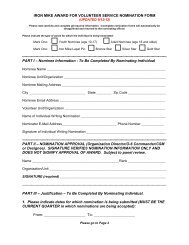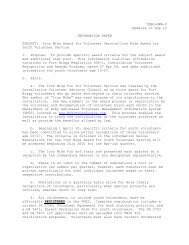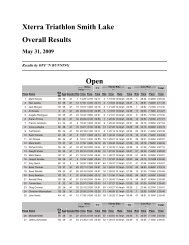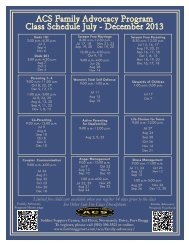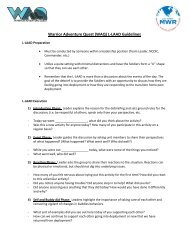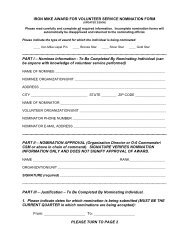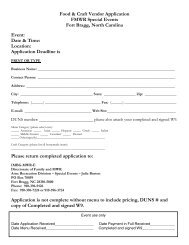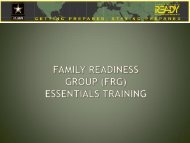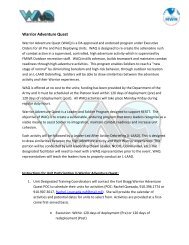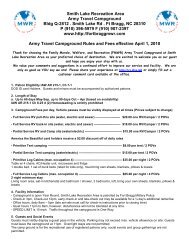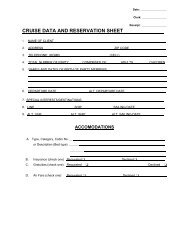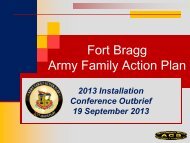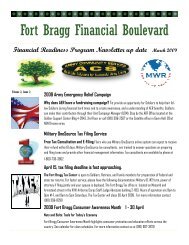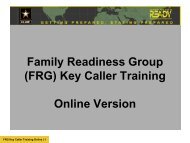August 2011 - Fort Bragg
August 2011 - Fort Bragg
August 2011 - Fort Bragg
You also want an ePaper? Increase the reach of your titles
YUMPU automatically turns print PDFs into web optimized ePapers that Google loves.
<strong>August</strong> <strong>2011</strong>
HILD, YOUTH AND SCHOOL SERVICES (CYSS)<br />
Administrative Offices<br />
Soldier Support Center, Normandy Drive, 4th Floor<br />
CYSS Registration 396-8110/5128<br />
Child Development Services 396-4313/908-2564<br />
Family Child Care 396-3415<br />
Food Programs 396-5601/6674<br />
Outreach Services<br />
Registration 396-8110/5128<br />
Special Needs 396-5128<br />
Kids on Site (SSC Basement) 396-2465<br />
Juvenile Justice Coordinator 396-1270<br />
<strong>Fort</strong> <strong>Bragg</strong> Scout Liaison 396-1270<br />
National Visiting Youth Program 396-1270<br />
Program Operations 396-0124<br />
Training & Curriculum Specialists 396-1907<br />
Youth Education Support Services 432-1008<br />
Youth Services 396-5780<br />
Youth Services Sports 396-9123<br />
Sites<br />
Bauguess Child Development Center (Longstreet) 907-5750/5748<br />
Cook Child Development Center 396-2989/3349<br />
Gruber Road (COSCOM Area)<br />
Fernandez Child Development Center 396-4733/3936<br />
Knox St (Adjacent to Irwin Middle School)<br />
Pope Child Development Center 394-4323<br />
Armistead Rd.<br />
Prager Child Development Center 396-1136/3836<br />
2nd Street (adjacent to Main Commissary)<br />
Rodriguez Child Development Center & School Age Services<br />
Sicily Dr (one block off Normandy Dr) 396-5429/6979<br />
Rodgers Child Development Center<br />
2nd Street (adjacent to North Commissary) 432-5933/5281<br />
Kids on Site (Hourly Care) 396-2465<br />
Soldier Support Center<br />
Tolson Youth Activities Center 396-5437<br />
(Corner of Reilly St & Normandy Dr)<br />
Wonderful World for Kids 396-<strong>2011</strong>/2931<br />
Knox St (adjacent to Watters Center)<br />
Morales School Age Services 432-6033/5275<br />
Rockefeller Blvd. (Linden Oaks)<br />
Pope School Age Services (Armistead Rd.) 394-2869<br />
Youth Services Sports Warehouse 396-6712<br />
(Corner of Woodruff & Jackson Street)<br />
Visit Our Website www.fortbraggmwr.com<br />
2
CHILD, YOUTH AND SCHOOL SERVICES<br />
FORT BRAGG, NORTH CAROLINA<br />
RESOURCE GUIDE FOR<br />
CHILD, YOUTH AND SCHOOL SERVICES (CYSS) FAMILIES<br />
Page<br />
4 Mission Statement<br />
4 Goals<br />
4 - 7 <strong>Fort</strong> <strong>Bragg</strong> Programs<br />
8 Who is Eligible to Participate in CYSS Programs?<br />
9 Registration<br />
10 Waiting List<br />
11 Disenrollment<br />
11 - 12 Payments and Late Fees<br />
13 Program Closures<br />
14 Parent Orientation<br />
14 Parent Advisory Councils<br />
14 - 15 Admission and Release Procedures<br />
16 Health Records<br />
17 Emergency Medical Treatment<br />
18 Re-Admission Following Illness<br />
19 Administering Medication<br />
20 - 22 Behavior Management<br />
22 DoD Child Abuse Hotline<br />
23 CYSS Volunteers<br />
24 Waiting list Application<br />
25 - 26 <strong>Fort</strong> <strong>Bragg</strong> Home Alone Policy<br />
27 - 28 <strong>Fort</strong> <strong>Bragg</strong> Curfew for Juveniles<br />
3
1. Mission.<br />
CHILD, YOUTH AND SCHOOL SERVICES<br />
FORT BRAGG, NORTH CAROLINA<br />
RESOURCE GUIDE FOR<br />
CHILD, YOUTH AND SCHOOL SERVICES (CYSS) FAMILIES<br />
To enhance Soldier readiness and well-being by reducing the conflict between Soldier<br />
mission requirements and parental responsibilities.<br />
2. Goals.<br />
To provide affordable program options to military children and youth from ages 4 weeks to<br />
18 years of age.<br />
3. <strong>Fort</strong> <strong>Bragg</strong> Programs.<br />
a. Child Development Services (CDS). (396-4313, Admin) Hourly, part-time, full-day<br />
care and extended evening care for children ages 4 weeks to 5 years in centers which are<br />
nationally accredited and state licensed.<br />
(1) Bauguess Child Development Center. (907-5750/5748) Longstreet.<br />
(2) Cook Child Development Center. (396-2989/3349) Gruber Road.<br />
(3) Fernandez Child Development Center. (396-4733/3936) Knox Street (adjacent to<br />
Irwin Middle School)<br />
(4) Pope Child Development Center. (394-4323)<br />
(5) Prager Child Development Center. (396-1136/3836) 2nd Street (adjacent to<br />
North Commissary)<br />
(6) Rodriguez Child Development Center. (396-5429/6979) Sicily Drive (one block<br />
off Normandy Drive)<br />
(7) Rodgers Child Development Center. (432-5933/5281) 2nd Street (adjacent to<br />
North Commissary)<br />
4
. Family Child Care (FCC). (396-3415, Admin)<br />
(1) Serves children age 4 weeks 12 years old. FCC provides full time, part day, long<br />
term, before and after school care, Special Needs, extended, overnight, and hourly care.<br />
Some homes are bilingual and multi-cultural on and off post. FCC providers are certified<br />
by the National Association for Family Child Care (NAFCC.)<br />
(2) ArmyFCC.COM is a marketing and management tool designed to enhance<br />
parents and potential patrons’ perception of Family Child Care. The website provides the<br />
FCC provider with an opportunity to demonstrate their professionalism. In addition,<br />
ArmyFCC.com will provide parents and potential patrons with up- to-date information<br />
about Family Child Care Homes. There are two sections to ArmyFCC.Com. The public<br />
section describes the Installation FCC Program. This portion of the website is maintained<br />
by the FCC Director and can be reached by anyone with internet access at<br />
http://www.ArmyFCC.com. The secure section describes each of the FCC Homes at the<br />
Installation and is made up of FCC Provider Profiles. Each FCC Provider Profile is meant<br />
to show parents and potential patrons the excellence of Family Child Care. Parents and<br />
potential patrons will only be able to access the secure section of the ArmyFCC.com<br />
website at the CYSS Parent Central Services under guidance of trained staff.<br />
c. School Age Services (SAS). (396-5780, Admin)<br />
(1) Locations:<br />
- Wonderful World for Kids (396-<strong>2011</strong>/4621) on Knox Street adjacent to the<br />
Watters Center.<br />
- Morales SAS. (432-6033/5275) on Rockefeller Blvd. in Linden Oaks.<br />
- Pope SAS. (394-2869) on Armistead Road, Pope AAF.<br />
- Rodriguez Site (396-5429/6979) on Sicily Drive (one block off Normandy Drive)<br />
(2) SAS offers a wide range of quality out-of-school experiences for children in<br />
kindergarten 4th grades in supervised, age-appropriate programs. Programs incorporate<br />
character building concepts through challenging activities and social interaction. Activities<br />
are designed to enhance positive attitudes in learning and self-development.<br />
SAS offers breakfast before school, transportation to and from special activities and<br />
instructional programs, and full day care for “school out” days (includes nutritional<br />
breakfast, lunch, and snacks.)<br />
(3) Winter, Spring, Jammin’ Camp Geronimo Summer camp and intersession camps.<br />
(4) After school programs are available for school out days for traditional and yearround<br />
students who live in surrounding counties.<br />
5
d. Middle School and Teen Programs.<br />
(1) Locations: Tolson Youth Activities Center. (395-5437) on the corner of Reilly<br />
Street and Normandy Drive.<br />
(2) A chartered affiliate of the Boys and Girls Club of America and a partner with 4-<br />
H Cooperative Extension.<br />
(3) Programs are designed to provide out of school services and activities for middle<br />
school and teen youth in 5th-12th grades. The programs are committed to meeting<br />
community needs. They provide winter, spring, summer camps as well as specialty camps<br />
and sports camps. Limited transportation is available to selected schools, free or fee for<br />
service.<br />
(4) After school programs are available for school out days for traditional and yearround<br />
students who live in surrounding counties.<br />
(5) HIRED Program. A workforce-preparation and apprenticeship program for 15 -<br />
18 year old teens with a parent who is either active duty Army or a DoD civilian employee<br />
on <strong>Fort</strong> <strong>Bragg</strong>.<br />
e. CYSS Annual Special Events. Parent-Youth Deer Hunts; Fishing Derby; Dances;<br />
Open Houses; Children’s Fest; Halloween Carnival; Easter Carnival; Winter Carnival;<br />
Nutrition Fest.<br />
f. Parent and Outreach Services. (396-5128 Admin)<br />
(1) Parent Central Services. (396-8110/5128). One stop registration for CYSS<br />
patrons. Location and hours of operation: Soldier Support Center, Normandy Drive, 4th<br />
Floor. 0830-1700, Monday-Friday.<br />
(2) Kids on Site (KOS). (396-2465). Ages 6 weeks 12 years. Current shot records<br />
required.<br />
- A flexible child care program for ages 6 weeks 12 years at our permanent KOS<br />
site on the ground floor of the Soldier Support Center or other approved KOS sites<br />
on <strong>Fort</strong> <strong>Bragg</strong>.<br />
- KOS is available for Family Readiness Groups, Welcome and PCS Briefs,<br />
religious functions, Hail & Farewell’s, Battalion Coffees, OSC and NCO Spouses<br />
functions, Unit Formals and parties, and play groups.<br />
- KOS also offers <strong>Fort</strong> <strong>Bragg</strong> families hourly care for parents who have medical<br />
appointments, volunteer commitments, business appointments, want to shop<br />
without their children or are in/out-processing.<br />
6
- KOS programs offer a variety of age appropriate developmental activities as well<br />
as nutritious meals or snacks at no extra cost to parents.<br />
(3) Volunteer Child Care in Unit Settings (VCCUS). (396-5128)<br />
- VCCUS is designed to meet the needs for occasional no-cost, volunteer child care<br />
in an approved unit setting for unit family members and private organizations<br />
during activities involving family support groups, spouse meetings, and special unit<br />
functions.<br />
- VCCUS training is available to individuals within a military unit or recognized<br />
organization on <strong>Fort</strong> <strong>Bragg</strong>. Parent Outreach Services will provide the training and<br />
qualify volunteers to operate a VCCUS.<br />
(4) Special Needs Accommodation Process (SNAP). (396-5128).<br />
Addresses the needs of children with health issues. Some of the issues addressed include<br />
allergies, asthma, heart murmurs, developmental delays, physical, social, emotional<br />
learning or behavioral concerns, and educational needs. Some conditions will require<br />
medical action plans (MAP’s) i.e. asthma, diabetes, seizures, special diet and allergies.<br />
MAP’s are available for download at fortbraggmwr.com, under CYSS. A SNAP Team<br />
evaluates and establishes goals to help ensure appropriate placement. We recommend<br />
parents to coordinate a SNAP evaluation well in advance to ensure the team can review the<br />
case in a timely manner. Parents are a vital part of this team. Depending on your child’s<br />
condition you may be required to attend a SNAP meeting.<br />
(5) National Visiting Youth Program (NVYP). (396-1270). An opportunity for<br />
nationally recognized youth groups to spend a weekend at <strong>Fort</strong> <strong>Bragg</strong> and become familiar<br />
with the goals, customs, and traditions of the Army.<br />
(6) <strong>Fort</strong> <strong>Bragg</strong> Boy & Girl Scouts Liaison. (396-1270).<br />
Liaison for on-post scouting activities for Area 33 Girl Scouts of the United States and<br />
TUOCS District Boy Scouts.<br />
(7) <strong>Fort</strong> <strong>Bragg</strong> Juvenile Justice Coordinator. (396-1270).<br />
Administers the disposition of misconduct committed by juveniles on <strong>Fort</strong> <strong>Bragg</strong> through<br />
the Juvenile Rehabilitation Board (JRB.) The board is designed to rehabilitate juveniles<br />
through counseling, education, community service, restitution, and other means of<br />
corrective action in order to protect the best interests of juveniles and the <strong>Fort</strong> <strong>Bragg</strong><br />
Community.<br />
g. Youth Education Support Services (YESS). (432-1008) Soldier Support Center,<br />
Normandy Drive, 4th Floor, Room 420.<br />
(1) Youth Education Liaison Services. Programs include SKIES, America’s Promise<br />
Youth Volunteers Program, Youth Leadership Initiatives, Youth Computer Lab &<br />
Homework Center Linkages, and Community Partnership Initiatives.<br />
7
(2) School Liaison Services. Programs include School Transition Support, Post<br />
Secondary Opportunities, Home School Support, Education Summit Issues, Partners in<br />
Education, and Installation/School Communication.<br />
(3) SKIESunlimited. Instructional program for youth of military and DoD civilians.<br />
Classes are designed to compliment and support the experiences children and youth have<br />
in Army CYSS and in schools.<br />
h. CYSS Food Services. (396-5601/1907). The CYSS Food Services participates in the<br />
United States Department of Agriculture (USDA) Child and Adult Care Food Programs<br />
and receives funding for food through this source. They develop menus and provide<br />
nutritious meals and snacks to all CYSS programs. They are also available to assist in<br />
developing menus for the Family Child Care providers.<br />
i. Training and Curriculum Specialists (TACS) & Training and Program Specialists<br />
(TAPS). (396-5601/6674). TACS and TAPS oversee CYSS employee training to ensure<br />
the highest quality care and out of school experiences for children and youth in our<br />
programs. Their duties encompass programs serving children 4 weeks to 18 years in Child<br />
Development Centers, Family Child Care homes, alternative care options, School Age<br />
Services, Youth Services Middle School and Teen programs, and STACC.<br />
j. Youth Sports Office (396-9123), Soldier Support Center, 4th floor. Sports Equipment<br />
Issue Warehouse (396-6712) on the corner of Jackson and Woodruff Street, Bldg 2-2408.<br />
4. Who is Eligible to Participate in CYSS Programs?<br />
a. CYSS programs are open to children of sponsors eligible to use Family and Morale,<br />
Welfare and Recreation activities as outlined in AR 215-1.<br />
b. Priority.<br />
(1) Single/dual active duty military personnel, DoD civilian personnel, reservists on<br />
active duty.<br />
(2) Sponsors from priority 1 plus DoD contractors, whose spouse is a fulltime<br />
student or employed in a non-DoD job.<br />
(3) Sponsors from priority 1 whose spouse is unemployed and retirees.<br />
5. Registration.<br />
a. CYSS Annual Household registration is free as part of the Army Family Covenant.<br />
Registration is required when enrolling in any CYSS program. Initial or annual renewal of<br />
registration of household must be completed at Parent Central Services. Required<br />
documents can be downloaded at www.fortbraggmwr.com. Appointments can be made by<br />
emailing braggcysregistration@conus.army.mil or by calling 396-8110.<br />
8
. CYSS registration is transferable to other installations. Parents are required to update<br />
household data at their new duty station. When departing <strong>Fort</strong> <strong>Bragg</strong>, please fill out a<br />
disenrollment form in order to have your household data transferred to your new location.<br />
c. After initial enrollment, individual program enrollment can be made at any CYSS<br />
facility. Additionally, Sports, SKIES, Edge and hourly care reservations can be made<br />
online at www.webtrac.mwr.army.mil.<br />
d. CYSS uses the Child and Youth Management System (CYMS) for registration,<br />
payments, billings and all household demographics.<br />
e. Full-day and part-day waiting lists are available for on-post care. Vacancies are filled<br />
as they occur. Referrals are available for certified teenage babysitters. Referrals for offpost<br />
Child Care Centers and providers are available.<br />
f. Registration Requirements.<br />
(1) Military ID card or proof of employment for DoD and Federal Government<br />
employees.<br />
(2) Legal or official proof of child’s birth (passport, ID card, birth certificate.)<br />
(3) Current shot record for children birth-4th grade for child care programs.<br />
(4) Three local individuals who can be contacted in case of an emergency, their<br />
address and telephone number (home, work, cell phone.)<br />
(5) Current income statement for both the sponsor and the spouse. Fees are<br />
structured in accordance with DoD guidelines and based on total family income. (Includes<br />
all income except hazardous duty pay, clothing allowance, and child support.) Contact the<br />
Parent Central Services for information and an income category review should your total<br />
family income change.<br />
(6) Legally appointed guardians may apply for CYSS registration for children in<br />
their care. The following documentation is required: legal documentation of<br />
guardianship, medical power of attorney, proof of child’s age, proof of guardian’s military<br />
or DoD affiliation.<br />
(7) Special Needs Enrollees. Special Needs participants must furnish required<br />
medical documentation and a current physical. Some participants may be required to be<br />
evaluated by the Special Needs Accommodation Process (SNAP) prior to enrollment in<br />
CYSS programs.<br />
9
g. Refunds. Refunds may be processed on site, contingent on availability of funds, or<br />
may require a check being issued by Finance.<br />
(1) Refund requests for CYSS programs will be submitted in writing at those sites.<br />
Refund requests are due no later than 3 working days before the start of a program.<br />
(2) Refund requests for Instructional Programs, Youth Sports, and Camps must be<br />
in writing and received three working days prior to the start of a program.<br />
orders.<br />
(3) The following are reasons for non-standard refunds.<br />
- Refunds requested due to deployment or reassignment requires a copy of<br />
- Refunds due to medical reasons after the program or activity starts. A doctor’s<br />
statement is required when the request is submitted.<br />
6. Waiting List.<br />
a. The waiting list is centralized for all CYSS patrons. Priority is given in accordance<br />
with DoD guidelines. Patrons will notify CYSS when they deploy. Priority will be given to<br />
their children when they return, contingent on availability. Demand for CYSS programs<br />
sometimes exceeds the number of children and youth who can be served. Waiting lists are<br />
maintained at the Parent Central Services.<br />
b. Priority for filling care spaces is:<br />
(1) Single/dual active duty military personnel, DOD civilian personnel, reservists<br />
on active duty.<br />
(2) Sponsors from all priority 1 categories, plus DOD contractors, whose spouse is a<br />
full-time student or employed in a non-DOD job.<br />
(3) Sponsors from priority 1 whose spouse is not employed or retirees.<br />
c. Expectant mothers are encouraged to submit a waiting list application for child care<br />
to the CYSS Parent Central Services. Sponsors are subsequently responsible for calling the<br />
Parent Central Services every 90 days in order to remain on the waiting list.<br />
d. Patrons who notify the Parent Central Services when they deploy will be placed on a<br />
“Deployed Waiting List” and given priority placement when they return. Disenrollment<br />
forms for care programs are available at the sites only. Disenrollment forms for all other<br />
programs are available at Parent Central Services or the program sites.<br />
e. Waiting lists for Middle School and Teen programs, instructional programs, and<br />
sports programs are filled on a first come, first served basis, based on vacancies.<br />
10
7. Disenrollment (CDC and SAS)<br />
a. Disenrollment for care programs must be made a minimum of 2 weeks prior to the<br />
last date of attendance. Failure to submit the disenrollment will result in on-going<br />
assessment of fees.<br />
b. Exceptions for Disenrollment:<br />
(1) Valid PCS orders. Fees will be prorated based on the number of days service is<br />
needed.<br />
(2) Proof of Deployment. Parent central Services will maintain a copy on file. Your<br />
receipt is required when requesting a refund or credit for unused days of service. Service<br />
members who are deploying have the option of placing their children on a waiting list for<br />
reinstatement.<br />
8. Payments and/or Late Fees.<br />
a. CDC and SAS payments are due the 1st and 15th of each month. Late fees will be<br />
assessed on the 5th working day after each due date.<br />
b. Payments for Instructional Classes are due by the 15th of each month. If the 15th<br />
falls on a weekend or Federal Holiday, the due date is the Friday prior. Failure to pay will<br />
result in the child being dropped from the program.<br />
c. Subsequent to initial enrollment payments may be made at any CYSS facility or by<br />
visiting www.webtrac.mwr.army.mil.<br />
d. Payment Options.<br />
(1) Credit card (VISA or MasterCard).<br />
(2) Debit card; personal check; money order.<br />
(3) Cash.<br />
e. Delinquent Accounts (CDC and School Age Services.) Failure to pay within 2<br />
billing cycles will result in a DD 139 (Pay Adjustment Authorization) being forwarded to<br />
the Finance and Accounting Office for collection of the entire amount. Services may be<br />
denied. One Stop Processing will be notified and post clearance will be curtailed until the<br />
outstanding balance is paid.<br />
f. Children/Youth left after hours.<br />
(1) Child Development Services.<br />
11
- Children picked up after regular closing hours will be charged a $1 per minute<br />
with a maximum of $15 per site.<br />
- The staff will make several attempts to contact the parents or emergency<br />
contact. The Provost Marshal’s Office will be called to come and pick up children after 1<br />
hour of business closing.<br />
(2) Family Child Care (FCC).<br />
- FCC Providers will attempt to call parents or emergency contacts. If they cannot<br />
contact the designee, the Provost Marshal’s Office will be called to come and pick up<br />
children who are not picked up after 1 hour. Parents will be charged a late fee, as specified<br />
in the contract between parents and the FCC Provider.<br />
(3) School Age Services.<br />
- Children picked up after regular closing hours will be charged a $1 per minute<br />
with a maximum of $15 per site.<br />
- The staff will attempt to call parents or the individual designated for emergency<br />
contact if a youth has not been picked up 1 hour after closing. If that fails, the Provost<br />
Marshal’s Office will be called to come and pick up the child(ren.)<br />
(4) Youth Services/Youth Sports.<br />
- The Provost Marshal’s Office will be called to come and pick up youth who<br />
remain more than 1 hour after programs close.<br />
9. Program Closures.<br />
a. CYS programs are closed for Federal Holidays.<br />
b. Inclement Weather or Other Emergencies. Patrons will not receive credit or<br />
reimbursement due to inclement weather. Instructional classes will schedule make-up<br />
classes.<br />
(1) Child Development Centers and Family Child Care Homes. In the event of<br />
inclement weather or other emergencies and the installation remains open, Child<br />
Development and School Age Centers will open a minimum of 30 minutes prior to official<br />
post opening for full day, part day preschool, hourly care and More@Four programs. If<br />
<strong>Fort</strong> <strong>Bragg</strong> Schools are closed due to inclement weather, part day preschool and<br />
More@Four at Rodriguez Child Development Center will be closed. These programs will<br />
operate on the <strong>Fort</strong> <strong>Bragg</strong> Schools schedule. If the installation is closed, all CYSS facilities<br />
will be closed. Only essential personnel needing to report to duty will be directed to<br />
Family Child Care Providers. On days schools are in session and the decision is made to<br />
close early due to weather conditions, part day preschool (Rodriguez CDC) and<br />
12
More@Four (Rodriguez CDC) children will need to be picked up early by parents or<br />
emergency designees. Child Development and School Age Centers will operate on the Post<br />
schedule for early closures. Family Child Care will have at least 15 homes available to<br />
provide care when the installation is closed. This provider list will be updated monthly and<br />
can be attained at all Care program sites. If the installation reopens on a delayed schedule,<br />
the program sites will open 30 minutes prior to the official installation opening.<br />
(2) School Age Services. If <strong>Fort</strong> <strong>Bragg</strong> Schools close due to inclement weather prior<br />
to school start time and the installation remains open, SAS will maintain a full day<br />
schedule. Our programs will continue to operate as long as the installation remains open. If<br />
schools remain closed due to extended bad weather conditions and the installation is<br />
operational, the SAS program will open 30 minutes prior to the installation opening.<br />
EXAMPLE: The media announces the installation will open at 10 a.m., SAS will open at<br />
9:30 a.m. On days school is in session and the decision is made to close early due to<br />
weather conditions, <strong>Fort</strong> <strong>Bragg</strong> schools will be responsible for notifying patrons. Extended<br />
on-site care will be provided on those days.<br />
(3) Tolson Youth Activities Center. When <strong>Fort</strong> <strong>Bragg</strong> schools close due to inclement<br />
weather or other emergencies and the installation remains open, middle school and teen<br />
programs will maintain a full day schedule. Children will not be transported to off-site<br />
activities and parents must pick up their children at school. Programs will continue to<br />
operate as long as the installation remains open. Instructional classes and sports activities<br />
will be canceled. These activities will be rescheduled for a later time, once weather<br />
conditions or other emergency situations stabilize and parents can safely transport their<br />
children. If the installation reopens on a delayed schedule and <strong>Fort</strong> <strong>Bragg</strong> schools are<br />
closed, the building will open 30 minutes prior to the official installation opening.<br />
c. Evacuation Plans. Plans and procedures are available at each CYSS site in the event<br />
a site is evacuated for safety, security, or any other unforeseeable reason.<br />
10. Parent Orientation.<br />
a. Child Development Centers and Family Child Care programs. Parents must attend an<br />
orientation during their first month of enrollment in a CDC or the Family Child Care<br />
Program. The CDC staff will discuss programs, health procedures, administrative<br />
procedures, parent involvement, and provide other information pertinent to the programs.<br />
Parents using the CDC sites may tour the facilities and meet the staff prior to child(ren)<br />
beginning care.<br />
b. School Age Services. Parents must attend an orientation during the first month of<br />
their child’s enrollment. The staff will discuss program policies, staff qualifications, and<br />
program operations. The orientations are designed to discuss program specific concerns<br />
and answer questions. Families may tour facilities and meet the staff during Open House in<br />
<strong>August</strong> or by appointment.<br />
13
c. Youth Services/Youth Services Sports. Mandatory orientation for parents of newly<br />
enrolled youth is held at 1800 on the 2nd Tuesday of each month at the Tolson Youth<br />
Activities Center. The orientation clarifies program guidelines and allows parents to tour<br />
the facility and program areas.<br />
11. Parent Advisory Councils. CYSS sites conduct monthly meetings with staff and<br />
parents. An open forum allows parents and staff to address areas of interest concerning<br />
programs, requests for changes to policy, and information regarding CYSS programs. A<br />
quarterly council meeting is conducted to address overall CYSS issue.<br />
12. Admission and Release Procedures.<br />
a. Child Development Centers. Children enrolled in CDC programs must swipe their<br />
CYSS registration card in and out at the front reception desk. Only parents or parent<br />
designees are allowed to pick up children unless prior written documentation is furnished<br />
to the staff, allowing someone else to pick up the child(ren.) Parent designees are required<br />
to produce identification. Parents will not be denied access to their child(ren), including the<br />
right to pick up the child(ren), unless a copy of a custody agreement or court restraining<br />
order relinquishing such parental right, is on file with the CDC staff and the CYSS Parent<br />
Central Services.<br />
b. Family Child Care. Only parents or parent designees are allowed to pick up children<br />
enrolled with a Family Child Care provider unless prior written documentation is furnished<br />
to the provider, allowing someone else to pick up the child(ren.) Parent designees are<br />
required to produce identification. Parents will not be denied access to their child(ren),<br />
including the right to pick up the child(ren), unless a copy of a custody agreement or court<br />
restraining order relinquishing such parental right, is on file with the provider and the<br />
CYSS Parent Central Services.<br />
c. School Age Services.<br />
(1) Parents must swipe their child’s CYSS Registration cards in and out of CYMS<br />
located at the front reception desk. This does not preclude group busing to a specific SAS<br />
facility or program.<br />
(2) SAS staff who bus youth to and from school will call roll and swipe the cards<br />
for those children into the facility. Parents are responsible for notifying the SAS staff when<br />
their child(ren) is not attending a program or will be absent from school.<br />
(3) Only parents or parent designees may pick up children unless staff is furnished<br />
written documentation allowing someone else to pick up the child(ren.)<br />
(4) Children will not be released to siblings or other children under age 14.<br />
(5) Parent designees will be requested to produce identification until such time as the<br />
staff recognizes them by sight.<br />
14
(6) Parents will not be denied access to their child, including the right to pick up the<br />
child, unless a copy of the custody agreement or court restraining order that relinquishes<br />
such parental rights is on file with the SAS staff.<br />
d. Tolson Youth Activities Center.<br />
(1) Youth enrolled in programs must swipe their CYSS Registration cards in and out<br />
at the front desk.<br />
(2) Parents must notify the staff if child(ren) enrolled in Club house program will not<br />
be attending the program or will be absent from school.<br />
(3) Only parents or parent designees may pick up children unless prior written<br />
documentation is furnished to the staff allowing someone else to pick them up. Parental<br />
release authorizing youth to sign out of the program are available. All authorizations will<br />
be maintained in the child’s file.<br />
(4) Youth who participate in Open Recreation may do so without parental<br />
permission. Youth are permitted to leave the facility at any time.<br />
(5) Youth Services is not responsible for monitoring the outdoor areas of the Tolson<br />
Youth Activities Center unless there is a scheduled outdoor activity option posted on the<br />
day’s calendar.<br />
(6) Parents will not be denied access to their child(ren), including the right to pick up<br />
the child(ren), unless a copy of the custody agreement or court restraining order that<br />
relinquishes such parental rights is on file with Youth Services.<br />
13. Health Records.<br />
a. Child Development Centers, Family Child Care, and School Age Services.<br />
(1) Health assessments will be maintained on currently enrolled youth at the CYSS<br />
Parent Central Services, and at the program sites your child(ren) attend.<br />
(2) Children attending care program must have a health assessment within 30 days of<br />
enrollment. Services will be denied to patrons not meeting this requirement. Appointments<br />
for physical exams should be made immediately upon registration with the sponsor’s<br />
designated medical care facility. The completed form must be returned to the CYSS Parent<br />
Central Services or at your child(ren)s program site. Special needs must be annotated as<br />
part of the physical. (See paragraph 3.f.(4), page 6)<br />
(3) Health assessments are valid for 3 years from the date of the physical unless the<br />
child’s health status changes. Parents are responsible for updating health records with the<br />
CYSS Parent Central Services annually or when your child’s health status changes.<br />
15
(4) Current shot records for children birth-4th grade are a requirement and will be<br />
maintained at the CYSS Parent Central Services and at the program sites your child(ren)<br />
attend.<br />
(5) Parents are required to maintain current information with CYSS.<br />
(6) Children must be free of communicable disease in all CYSS programs.<br />
b. Youth Sports.<br />
(1) Sport physicals are maintained in the Youth Sports Office. They remain current<br />
for one year and must be current during any given sports program.<br />
(2) Special Needs documentation must be annotated on sports physicals.<br />
(3) Parents are required to maintain current information with CYSS Parent Central<br />
Services and program coordinators.<br />
(4) Youth must be free of communicable disease.<br />
14. Emergency Medical Treatment.<br />
a. Child Development Centers.<br />
(1) Medical Emergencies. Children who develop conditions after admission<br />
requiring immediate emergency medical attention will be taken to Womack Army Medical<br />
Center Emergency Room by ambulance for evaluation. Every effort will be made to<br />
contact parents prior to this action.<br />
(2) Minor Health Problems. A child who becomes ill or injured while at a Center<br />
will be isolated from the group and closely monitored. This is for the comfort of the child<br />
and the protection of the other children. Once parents, or authorized designee is notified<br />
they must pick up the child within 60 minutes.<br />
(3) Issues concerning the course of action to be taken in terms of health problems<br />
will be addressed to the Community Health Nurse.<br />
b. Family Child Care Homes (On and Off-Post.)<br />
(1) The Provider will assess the child’s condition.<br />
(2) Give first aid and CPR, if necessary.<br />
(3) Call 911 or other appropriate emergency help, as needed.<br />
(4) Contact the parents or designated contact person and the FCC Office.<br />
16
(5) Minor Health Problems. A child who becomes ill or injured while in a home will<br />
be isolated from the group and closely monitored. This is for the comfort of the child and<br />
the protection of the other children. Once parents, or authorized designee is notified they<br />
must pick up the child within 60 minutes.<br />
c. Youth Services, Youth Sports, School Age Services.<br />
(1) Consent for Medical Treatment or examination of children is a requirement for<br />
enrollment in programs. It authorizes the staff to take a youth for emergency medical care.<br />
Every effort will be made to notify a parent prior to such action. Emergency treatment at<br />
an Army Medical Facility may be provided without additional consent under the<br />
provisions of AR 40-3, paragraph 2-19.<br />
(2) Medical emergencies that require immediate attention while a child(ren) is in the<br />
program will be taken to a medical facility for evaluation. Minor health problems will be<br />
handled by on-site staff. Staff will notify parents or emergency designee when youth<br />
become ill or injured during the time they are in the program. As a general rule, children<br />
with illness will remain isolated from other children until such time as reasonable<br />
arrangements can be made for their release to parents or designated parent representative.<br />
(3) Issues concerning the course of action to be taken in terms of health problems<br />
will be addressed to the Community Health Nurse.<br />
15. Re-admission following illness. Child(ren) may return to programs when they feel<br />
well enough to participate in usual daily activities and the following conditions exist:<br />
a. Contagious stage of illness has passed after treatment has begun and parents<br />
produce documentation that child can return to program..<br />
b. Child(ren) is able to function in the program setting.<br />
c. Fever has been absent for 24 hours without the aid of fever reducing medication.<br />
d. Nausea, vomiting, or diarrhea has subsided for 24 hours.<br />
e. Parents have administered the first dose of the medication prescribed for the illness.<br />
Child(ren) must be on oral medication at least 24 hours before the CYSS staff will start to<br />
administer medication.<br />
f. Chicken pox lesions are crusted.<br />
g. Scabies are under treatment.<br />
h. Lice are under treatment.<br />
i. Pinworm treatment has occurred 24 hours before re-admission.<br />
17
j. Lesions from impetigo are no longer oozing and are under treatment.<br />
k. Conjunctivitis is under treatment and eyes are no longer discharging.<br />
l. Child(ren) has completed the physician’s and Center of Disease Control definition of<br />
contagious stage of the illness.<br />
16. Administering Medication.<br />
a. Children will not be forced to take medication.<br />
b. Requests for CYSS staff to administer medication to children with special needs<br />
must be submitted to the Director, Outreach Services, for exception to policy.<br />
c. A new DA 5225-R (Child Development Services (CDS) Medical Dispensation<br />
Record) , Jul 89, must be submitted at the start of each month if medication is required on<br />
a continuing basis.<br />
d. The label on the bottle must be current for the month for medication taken more than<br />
30 days.<br />
e. Medication must be in the original container with a childproof cap. Containers and<br />
their labels must be kept clean and information written on the container must be legible.<br />
f. Medication must be dated with the licensed health care provider’s name, telephone<br />
number, and instructions for use as well as the child’s name, name of medication, and<br />
dosage strength.<br />
g. No medication will be administered by staff on an “as needed” basis.<br />
h. Medication will be stored in a locked cabinet. Only authorized individuals will be<br />
allowed to remove and administer medications. Medications requiring refrigeration will be<br />
isolated within the refrigerator in a separate, secured container.<br />
i. No over-the-counter medications will be dispensed by CYSS staff or coaches. All<br />
medication administered will be properly recorded on the Medication Dispensation<br />
Record, DA Form 5225-R, by the person dispensing the medication.<br />
j. Permanent medication for children attending camps may be given to camp staff in<br />
weekly increments for dispensing with the exception of those medications that the<br />
Community Health Nurse has deemed the parent must provide daily (i.e. Ritalin) providing<br />
it is in the original container. The staff will return all empty medication containers to<br />
parents for disposal.<br />
18
k. The Community Health Nurse must approve in writing any exception to the<br />
medication policy. Request for exception to policy must be submitted to the appropriate<br />
site supervisor for consideration.<br />
l. No medication will be dispensed in non-care programs (Youth Sports, hourly care,<br />
SKIES, EDGE, YESS, etc.)<br />
m. Youth in grades 5-12 who attend full day Middle School and Teen (MST) programs<br />
are eligible to self-medicate. A physician’s certification is required for children in 5th-12th<br />
grade to self-medicate. The Special Needs Accommodation Process (SNAP) team will<br />
review youth’s medical records before self-medication is permitted.<br />
(1) Parents are required to update the Administering Medication card monthly.<br />
(2) On-site staff will observe youth administering medication and annotate DA Form<br />
5225-R (Child Development Services (CDS) Medical Dispensation Record,) Jul 89, and<br />
confirm the medication has been administered.<br />
(3) Parents will be called when medication is not brought to the program. Failure to<br />
bring medication for 3 consecutive days will result in denial of services for one week.<br />
Subsequent failure to bring medication will be discussed with parents. Appropriate<br />
additional denial of services may be imposed by the Chief, Youth and School Age<br />
Services.<br />
17. Behavior Management.<br />
a. Child Development Centers and Family Child Care.<br />
(1) The staff is trained in techniques of redirecting, role modeling, looking for causes<br />
of behavior and using appropriate encouragement and guidance following established<br />
procedures. Inappropriate behavior will be documented on an incident report and signed by<br />
the caregiver witnessing the incident and the supervisor. The parent must sign the report<br />
and receives the original copy. A second copy is placed on file at the center.<br />
(2) Recurring incidents will be brought to the attention of the Center management.<br />
The CDS Director will be notified and observations by Training and Curriculum Specialist<br />
(TACS) and Military Family Life Consultant (MFLC) will be scheduled within 48 hours.<br />
All observations and incidents will be documented. Continued incidents will be discussed<br />
with parents, as deemed necessary by Center management.<br />
(3) The Center Director and parents will request assistance from SNAPS to develop<br />
a behavior modification plan. If the parents are unwilling to participate, they will be given<br />
two weeks to make alternative child care arrangements.<br />
(4) An Individual Behavior Modification Plan (IBMP) will be developed within 10<br />
working days by a team consisting of the Center Director, Assistant Director, primary<br />
caregiver, TACS, CDS Coordinator, Director, Outreach Services and the Exceptional<br />
19
Family Member Program Director. This team will meet with the parents to discuss the<br />
IBMP and make further recommendations for its implementation. The IBMP will be<br />
monitored and reassessed by the Program Director in writing. If no progress is noted and<br />
documented incidents continue to occur, the team will meet to determine the next course of<br />
action.<br />
b. Youth Services, Youth Sports, School Age Services. Our staff is trained in<br />
techniques which ensure a positive approach to managing behavior. This includes focusing<br />
on reinforcement of acceptable behavior. The following guidelines are followed when<br />
dealing with youth:<br />
(1) Developmentally age appropriate activities are planned jointly by youth and staff<br />
along with activity choices to ensure maximum interest and involvement for each<br />
participant.<br />
(2) Clearly established guidelines outline the consequences of inappropriate<br />
behavior. Guidelines will be screened and approved by program managers before they are<br />
implemented.<br />
(3) Staff is trained and encouraged to reinforce positive behavior to include small<br />
rewards and incentives of special privileges in return for desired or improved behavior.<br />
(4) Youth will be given leeway to choose the majority of the daily activities which<br />
allows for independent play opportunities. Some activities will be group oriented to ensure<br />
each child benefits from learning to work within a group and problem solve with their<br />
peers. Youth will not be forced to participate in activities, but they should not disrupt the<br />
activities of others. Allowing youth to watch an activity if they choose, may result in them<br />
deciding to participate. This is a basic principle in behavior management. Due to<br />
supervision requirements, some activity areas may be closed until sufficient staff is<br />
available to staff multiple activity choices. The choice to participate in the activity will be<br />
left up to the youth.<br />
(5) Part of the CYSS mission is to provide opportunities for youth to learn lifelong<br />
skills. Conflict resolution is a critical skill for young people to learn to problem solve and<br />
negotiate compromise. This will help them when they become adults. In the Middle School<br />
Teen programs, youth will be encouraged to talk over their issues with other youth and try<br />
to come to resolution, with staff acting as mediators.<br />
(6) Parents will be informed when youth are consistently having problems following<br />
rules or when their behavior (hitting another youth; open defiance to the leader, support<br />
staff, or other youth) results in a safety or potential safety hazard to the youth or other<br />
members of the group that parental involvement is needed. A summarization of the<br />
incidents will be documented. Parents will be furnished a copy as well as given<br />
information regarding actions taken, a staff plan of action for modifying behavior in the<br />
future, and what actions could occur if behavior does not improve. To protect the privacy<br />
of youth members, incident reports will not list any other child by name.<br />
20
(7) The staff will use the following progressive method of behavior management<br />
dealing with routine discipline problems:<br />
- Staff will initially attempt to talk with the youth for disruptive inappropriate<br />
behavior, explain the nature of the problem and what expected behavior is. If behavior is of<br />
a violent severe nature, immediate suspension may be the consequence.<br />
- If this approach is not effective, the youth may be asked to step out of the activity<br />
to gain their composure and explore options of different ways to handle the situation<br />
should they be faced with it again. If an incident occurs which involves violence (physical<br />
or verbal) against another individual or is self inflicted, the youth will be removed<br />
immediately from the environment in order to protect themselves and others. Parents will<br />
be called to assist with modifying this type behavior and there will be a minimum of 24<br />
hour suspension. Depending on the nature of the incident, the youth can be suspended up<br />
to one week by the program manager. Recommendations for suspensions of more than one<br />
week are made by the program managers. Suspension period begins when child is picked<br />
up by parent.<br />
- In the event that redirecting is not effective, the youth may be counseled by staff.<br />
- If the above measures are not producing the desired results or behavior is out of<br />
the range of routine discipline, the following measures may be invoked:<br />
- The Director, Outreach Services may be asked for assistance in developing a<br />
behavior change plan as well as a plan outlining the consequences which may result if<br />
behavior change is not effective. Parents are encouraged to request verbal follow up reports<br />
daily to check on progress. If progress is not evident, parents will be asked to speak with<br />
the program manager to resolve issues such as changing existing plans of behavior<br />
management and/or the consequences of lack of progress.<br />
- Immediate expulsion from the program for youth who display excessively violent<br />
or disruptive behavior.<br />
- Parents will be referred to Womack Army Medical Center (the Community<br />
Health Nurse or Department of Social Work) for consultation regarding options available<br />
to assist them in having negative behavioral tendencies evaluated and assessed through<br />
appropriate agencies.<br />
18. Child Abuse DoD Hotline 1-800-336-4592. Preventing, identifying, reporting, and<br />
handling incidents of child abuse or neglect are the combined responsibility of all CYSS<br />
personnel in cooperation with the Family Advocacy Program (FAP.)<br />
21
19. CYSS Volunteers.<br />
a. Volunteers (youth and adults) play an essential role in our programs. They affect our<br />
Soldiers, their families, the organization, and installation readiness.<br />
b. Adult volunteers have the opportunity to volunteer at all CYSS programs. Contact<br />
the program site manager for details and applications.<br />
c. The Promise Passport Youth Volunteer Program is an Army initiative which<br />
promotes individual and group youth volunteer participation. Children and youth involved<br />
in this program increase their chances of becoming successful adults. Contact Youth<br />
Education Support Services (YESS) for details and applications.<br />
d. Benefits, Awards, Recognition. Volunteers are eligible for child care discounts, sport<br />
program discounts, youth volunteer incentives, and installation recognition.<br />
e. Acceptance of adult volunteers (age 18 and up) is contingent upon completion of<br />
appropriate background checks.<br />
f. Volunteers are required to register online through the Volunteer Management<br />
Information System (VMIS). Volunteers are required to keep track of their volunteer hours<br />
through VMIS.<br />
20. Home Alone Policy. XVIII Airborne Corps and <strong>Fort</strong> <strong>Bragg</strong> Policy #87, 8 Feb 10,<br />
specifies the level of supervision required for juveniles ages 17 years and under who live in<br />
quarters on <strong>Fort</strong> <strong>Bragg</strong> or use <strong>Fort</strong> <strong>Bragg</strong> facilities. The intent of this policy is to ensure the<br />
safety of children by not leaving them unattended under circumstances involving potential<br />
or actual risk to the child’s health and safety. (Appendix B).<br />
21. Curfew for Juveniles. XVIII Airborne Corps and <strong>Fort</strong> <strong>Bragg</strong> Policy #20, 31 Jan 05,<br />
establishes a curfew for juveniles ages 17 years and under who are found on <strong>Fort</strong> <strong>Bragg</strong>,<br />
outside government quarters or government-leased housing during designated hours.<br />
(Appendix C).<br />
DoD Child Abuse Hotline<br />
1-800-336-4592<br />
22
Resource Guide for Child & Youth Services (CYS) Families<br />
Appendix A<br />
<strong>Fort</strong> <strong>Bragg</strong> Child and Youth Services<br />
Request for Services Record<br />
23
Resource Guide for Child & Youth Services (CYS) Families<br />
Appendix B<br />
XVIII Airborne Corps and <strong>Fort</strong> <strong>Bragg</strong> Memo 25-50<br />
Master Policy No. 87, 8 February 2010<br />
Home Alone Policy<br />
24
Appendix B<br />
Home Alone Policy (2)<br />
25
Resource Guide for Child & Youth Services (CYS) Families<br />
Appendix C<br />
XVIII Airborne Corps and <strong>Fort</strong> <strong>Bragg</strong> Memo 25-50<br />
Master Policy No. 20, 4 April 2005<br />
Curfew for Juveniles<br />
26
Appendix C<br />
Curfew for Juveniles (2)<br />
27



